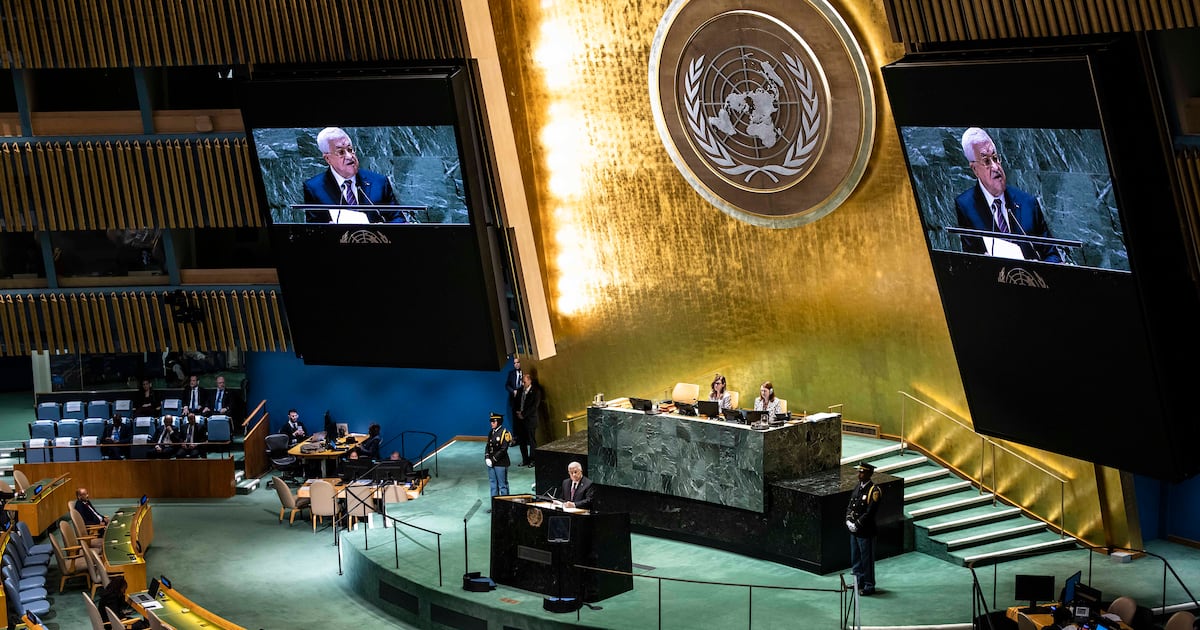World
US Denies Visa to Palestinian Leader Abbas Ahead of UN Meeting

The United States has barred Palestinian Authority (PA) President Mahmoud Abbas and approximately 80 other officials from attending a major United Nations gathering next month. This decision coincides with plans by several US allies to formally recognize Palestine as a state during the annual high-level UN General Assembly in New York City.
A spokesperson from the State Department confirmed that the visa denial affects members of the umbrella Palestine Liberation Organisation (PLO) as well as officials from the PA, which is based in the West Bank. Abbas intended to participate not only in the General Assembly but also in a summit hosted by France and Saudi Arabia. Countries including Britain, France, Australia, and Canada are expected to announce their recognition of a Palestinian state at this event.
Abbas’s office expressed its astonishment over the visa decision, claiming it contravenes the 1947 UN headquarters agreement that mandates the US to facilitate diplomatic access for foreign representatives. While the US acknowledges this requirement, it maintains the right to deny visas based on security and foreign policy considerations.
The State Department justified its action, reiterating long-standing concerns that the PA and PLO have not adequately denounced extremism while seeking “unilateral recognition” of statehood. “It is in our national security interests to hold the PLO and PA accountable for not complying with their commitments, and for undermining the prospects for peace,” the statement read. Palestinian officials have categorically rejected these allegations, arguing that decades of US-mediated negotiations have not succeeded in ending the Israeli occupation or establishing an independent Palestinian state.
Stephane Dujarric, a spokesperson for the UN, indicated that discussions regarding the visa issue would take place with the State Department, emphasizing adherence to the UN headquarters agreement. Historically, the US has previously denied visas to Palestinian leaders, including Yasser Arafat in 1988, which resulted in the UN General Assembly being relocated to Geneva to accommodate his address.
The State Department’s decision comes in the wake of the October 2023 Hamas attack, which escalated the ongoing conflict and has led to severe humanitarian crises in Gaza. In June, Abbas condemned the actions of Hamas in a letter to the French president, urging for the release of hostages taken by the group.
Israel’s Foreign Minister Gideon Saar welcomed the US decision, aligning with US and Israeli frustrations towards the recognition pledges from several Western nations. These pledges reflect growing dissatisfaction with Israel’s military actions in Gaza, which have resulted in significant loss of life and a humanitarian crisis, as well as ongoing settlement expansions in the West Bank.
Currently, at least 147 of the 193 UN member states recognize Palestine as a state, while Palestinians hold observer status in the UN, akin to that of the Holy See. They continue to seek statehood in the territories occupied by Israel, specifically the West Bank and Gaza, with East Jerusalem as their envisioned capital.
The US maintains that the path to a Palestinian state lies in direct negotiations between Israeli and Palestinian authorities, a stance that remains contentious in the context of ongoing violence and diplomatic tensions in the region.
-

 Top Stories2 months ago
Top Stories2 months agoTributes Surge for 9-Year-Old Leon Briody After Cancer Battle
-

 Entertainment3 months ago
Entertainment3 months agoAimee Osbourne Joins Family for Emotional Tribute to Ozzy
-

 Politics3 months ago
Politics3 months agoDanny Healy-Rae Considers Complaint After Altercation with Garda
-

 Top Stories3 months ago
Top Stories3 months agoIreland Enjoys Summer Heat as Hurricane Erin Approaches Atlantic
-

 World4 months ago
World4 months agoHawaii Commemorates 80 Years Since Hiroshima Bombing with Ceremony
-

 Top Stories2 months ago
Top Stories2 months agoNewcastle West Woman Patricia Foley Found Safe After Urgent Search
-

 Top Stories4 months ago
Top Stories4 months agoFianna Fáil TDs Urgently Consider Maire Geoghegan-Quinn for Presidency
-

 World4 months ago
World4 months agoGaza Aid Distribution Tragedy: 20 Killed Amid Ongoing Violence
-

 World4 months ago
World4 months agoCouple Convicted of Murdering Two-Year-Old Grandson in Wales
-

 World4 months ago
World4 months agoAristocrat Constance Marten and Partner Convicted of Infant Murder
-

 Top Stories3 months ago
Top Stories3 months agoClimbing Errigal: A Must-Do Summer Adventure in Donegal
-

 Top Stories3 months ago
Top Stories3 months agoHike Donegal’s Errigal Mountain NOW for Unforgettable Summer Views









